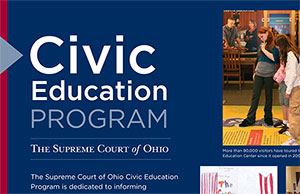Civic Education Focus of National Conference for Judicial Leaders

A recent national conference for judicial leaders featured a clearinghouse for ideas on civic education in the judicial branch, including the Ohio Supreme Court's program.

A recent national conference for judicial leaders featured a clearinghouse for ideas on civic education in the judicial branch, including the Ohio Supreme Court's program.
A leading educator informed state chief justices and court administrators that federal funds are no longer provided to K-12 schools for civics or history instruction.
Congress eliminated funding for school courses about government that last year totaled $154 million, said Sue Blanchette, immediate past president of the National Council for Social Studies (NCSS). Her remarks were part of a discussion on civics education at the annual meeting of the Conference of Chief Justices and Conference of State Court Administrators in St. Louis last week.
Blanchette said passage of the Sandra Day O’Connor Act, pending in the U.S. House of Representatives, would restore a portion of federal funds for government and history courses. Former U.S. Supreme Court Justice O’Connor has been a leading proponent of civics education since she retired from the Court in 2006.
What is most needed in civic learning and history is innovation in teaching strategies and programming to meet the needs of a diverse school population, Blanchette said, citing a NCSS report. A competitive grant process would identify and fund promising approaches that would strengthen civic learning in every school through innovation.
Discussion and exhibits demonstrated the most effective strategies for offering civic education to students and adults. Representatives from 22 states and national organizations presented displays and print and digital materials outlining successful programs, particularly those with a focus on legal and justice matters.
For example, the Boston-based organization, Discovering Justice, promoted its efforts to connect elementary and middle school students to civics and justice through classroom curriculum, afterschool programs and courthouse field trips. Washington State offers elementary, middle and high school teachers an opportunity to request a judge to teach an online, interactive lesson.
The Supreme Court of Ohio Education Program was among those that received a grant from the National Center for State Courts to participate in the Civics Fair. The display featured initiatives including the education center, Off-Site Court, Forum on the Law and the Justice Judy blog.


